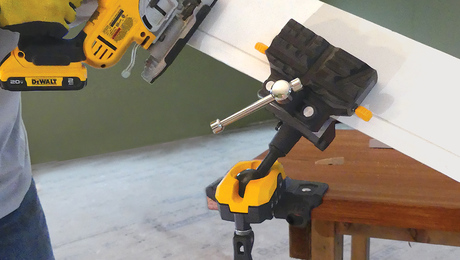We may be replacing our water heater soon. We are leaning toward a tank-type heater, because of our use patterns.
The heater (installed some time more than 35 years ago) sits in a closet in the middle of the house, and there’s currently no high and low combustion air. I’m also interested in some increase in efficiency, so am thinking about one of the direct vent/no pilot heaters, that draws its combustion air and vents its exhaust through concentric pipes. Questions:
1. These are usually described in the literature as permitting through wall venting, but we’d be running a stack up about 15 feet to go out the roof. This works fine on our little gas-powered radiant heater; can it be done with a water heater too?
2. Has anyone had experience with building inspectors OKing an installation without high and low combustion air with a heater like this that uses an outside source and sealed combustion?
3. Recommendations on good brands/models?



















Replies
Tankless can be a great way to go, and you have obviously given good thought to some of hurdles you'll encounter (besides sticker shock). Here are a few more:
The existing gas line is likely too small if you're on natural gas. Tankless heaters, if adequately sized for a normal household's needs, generally need about 200,000 BTU's, and this will mean a gas line of 1" unless the heater is very close to the meter.
Some manufacturers of tankless heaters require that you have soft water, which is a good idea anyway, since it takes only a very thin coating of hard water scale to greatly diminish the efficiency of heat exchanger.
If you install a direct-vent or sealed combustion heater, then no inspector should ask for anything more in the way of combustion air--the whole purpose of such appliances is to provide their own supply of combustion air.
Direct vent systems (pipe within a pipe, or 2 separate pipes) will mean either enlarging the existing roof penetration or adding one more.
Good brands that come to mind are: Bosch, Paloma, Tagaki, Rennai. Google "tankless water heaters", and there will be websites that compare the virtues of various brands and models. Best of luck!
Edited 2/27/2009 7:45 pm ET by rdesigns
Looking like a power vent is necessary, rather than simple direct vent - we're going out the roof. Brands: American, possibly Rheem, something called "U.S. Craftmaster."I'd hoped for a long warranty, but that seems to conflict with power vent and high efficiency...
Most warranties I know of are Pro-Rated. After a short period of time,basically worthless.
We used these State gas direct vent water heaters for years before we went to the Rinnai (and are now looking at the Navien condensing tankless to up grade from the Rinnai) it's a solid little tank style that uses no electricity and has some thermosiphoning reduction due to the direct vent in the concentric tube flue as compared to a conventional gas water heater.
It vents straight up as well as out the side wall with specific limitations in the install manual. The ones we installed did have a pilot light so there is standby losses there and only 35K BTU but we still heated houses and domestic hot water.
We don't use them anymore because we switched to the demand water heaters with tempering tanks but we are driving flat plate heat exchangers for indirect radiant floor heat off the tempering tanks and could easily do it off one of these.
http://www.stateind.com/prod/residential/res_gas_dv.html
------------------
"You cannot work hard enough to make up for a sloppy estimate."
With the sealed combustion, you don't need high/low venting; the unit has its own venting built into it. You should be able to vent through the roof ... follow the mfg recomendations.
Major brands will likely give you good equipment ... others may give you more specific recomendations,
Here's another option for you. When I remodeled my kitchen, I had to remove my flue stack. The furnace went hi-eff. And I had to choose between a power vented gas HWH and an electric model. My calcs showed the break even energy point at 80% efficiency. The gas htr also cost $200-300 more, with a more difficult installation. So I converted to a 50 gal Electric. Works great.
There are new tax credits posted here for efficient water heaters:
http://www.energystar.gov/index.cfm?c=products.pr_tax_credits
The credit is 30% of the cost up to $1500.
Unless you need large amounts of water at a time, I would seriously consider a Marathon electric model. They will last forever, and won't give you the hassle you'll get with these gas models.
They are very efficient because of the super insulation around them. They don't have a metal tank and all the fittings are brass. No rusty tanks or junk in the bottom of the tank.